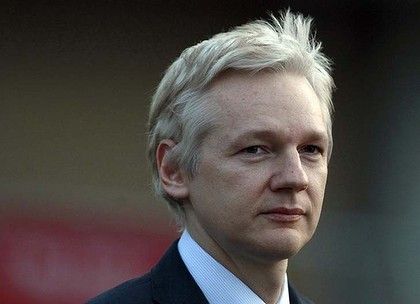
© ReutersWikiLeaks founder Julian Assange: "Where did you get my number?"
In about April last year, just before his name became a byword for, depending on your viewpoint, either transparency or treason, I attempted to interview WikiLeaks founder Julian Assange. Armed with a mobile phone number passed on to me by a colleague from an unknown source, I found myself talking to Assange himself. His response to the call was understandable and hypocritical.
His first words were: ''Where did you get my number?'' When I offered a vague explanation, he expressed displeasure that it had been passed on to me. It was a natural response given his organisation was in the process of severely embarrassing the almighty US government by releasing the video from an American attack helicopter showing non-combatants, including two Reuters newsagency staff, being shot dead. Assange had reason to cover his tracks, but missed the irony in being contacted via leaked information.
We conducted a stilted discussion in which he said he had already been interviewed by
Good Weekend (published subsequently), said he might talk to me if I had some information to trade, and required that I text my phone details. Apart from acknowledging that he received my SMS, I never heard from him again.
The WikiLeaks frontman's response was no different to some journalists who seem to give substance to the aphorism: suspicion of others stems from self-knowledge.
Many would dispute Assange's claim that he is a journalist, but I agree that in a loose sense he probably does qualify.
Journalism is changing as traditional news organisations contract. A couple of years ago I calculated there were probably three or four former journalists who had crossed to what we still in the business consider ''the dark side'', for every one left working for the mainstream media.
By the dark side I mean spin doctoring, public relating or otherwise manipulating information fed back to their former colleagues. Incidentally, I can't blame people taking this path given the contraction of media jobs; people have to earn a living.
Another change is the proliferation of dissemination outlets from organisations like ours, either online, a digital copy of the printed paper or an exclusive edition pitched to the disciples of Steve Jobs. We call these things platforms, a recently appropriated word which in the past was associated with railways stations, the manifestos of political parties or the type of shoes worn by people who favoured bell-bottomed trousers.
One of the most disturbing elements to working for a media organisation is that sometimes there is an expectation that you will use a lower level of scrutiny on your own place, compared with what would be extended to one outside. A colleague once commented about a place where I used to work, that upon entering the building we were expected to switch off our critical faculties and leave our bullshit detectors with security.
A year and a bit after my Assange encounter, this week I had the opportunity to interview the person who is filling in for the Australian-born international mystery man, as WikiLeaks frontman.
Bearing a name almost as challenging as an Icelandic volcano is Kristinn Hrafnsson. His last name pronounced a bit like ''Frobson'', except that the beginning sounds like a sort of guttural Nordic throat clearing. He stresses he is not replacing Assange as editor in chief, just filling in for him while he is otherwise engaged with a British court.
Hrafnsson does have traditional journalist credentials - he has even recently been made redundant (from the Icelandic government television channel, in July last year). The year before he was sacked by the country's private network after the program he was working on exposed loans made by one of Iceland's collapsed banks to an Iranian-born British businessman Robert Tchenguiz, who in March this year was arrested by British police and charged with fraud over the bank deal.
Hrafnsson, 49, is gravelly voiced, grey haired and he has put his life in danger to pursue stories, most recently going independently to Iraq to verify the facts behind the WikiLeaks footage of the civilians being shot from the US helicopter. He thinks this will become one of the defining images of the Iraq War, as the napalmed girl was of the Vietnam War.
Compared with the taciturn Assange, Hrafnsson seems an open book, but understandably he is reluctant to discuss any forthcoming WikiLeaks revelations. He says he is not sure about the future role of journalism and can't see where the business is going. ''In the past decade we have seen increased secrecy in governments.
Privatisation of things previously run by governments has been a factor; journalists have not been able to overcome that. And we see previously strong media organisations, like
The New York Times, sitting on stories because they have been asked to do so by governments. This would not have happened in the 1970s.''
Hrafnsson's views were a little depressing. The upside was that he had no problem with how I obtained his phone number.
Geoff Strong is a senior writer with The Age.
Comment: The principle of Wikileaks is sound and it has done some good in some cases. For that we salute them. The problem is it is just as useful for a "limited hangout" operation. "We'll let you find out about some of our dirt, which will distract everyone from the really bad stuff we're doing." We are so starved for anything resembling real information, we scramble gratefully for the smallest crumbs wile missing the larger strategies of the PTB.
For more background on Wikileaks see here:
Wikileaks and the War for your Mind
Beware Julian Assange and Wikileaks - Darlings Of The Mainstream Media
Wiki-Leaks and Plausible Lies - Where Have All The Critical Thinkers Gone?
Gordon Duff: Wikileaks, A Touch Of Assange and the Stench of AIPAC